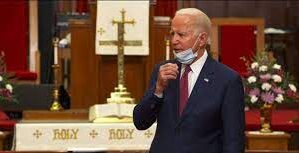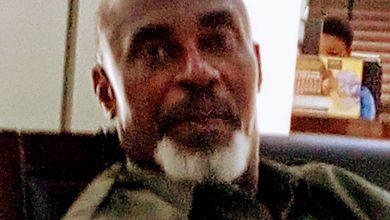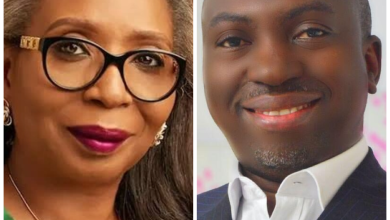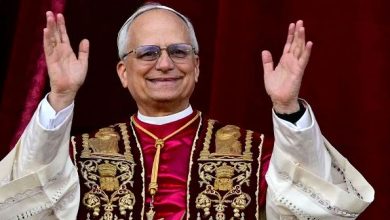Unique problem: Catholic bishops split over Biden’s support for abortion rights
...Debate whether the president should be denied communion

Photo:President Joe Biden in Church
By Harriet Sherwood religion correspondent
At some point this weekend, Joe Biden will take his place in a line of people approaching the altar of a Catholic church to receive communion.
The US president, a devout Catholic whose speeches regularly include biblical references and who carries a rosary that belonged to his late son, attends Mass every weekend – in Washington, his home town of Wilmington in Delaware, or wherever he happens to be traveling. If the traditional Sunday morning Eucharist service is not possible because of his schedule, he will receive the sacrament on Saturday evening as permitted by the Roman Catholic church.
“It’s really an encounter with God,” Father Kevin Gillespie of Holy Trinity in Washington, the church Biden usually attends in the capital, told the Atlantic earlier this year. For Biden, this “sacred and intimate moment” is a “gift that enhances his faith”, and “we most certainly encourage him to improve his intimacy with God through the Eucharist”.
But not everybody in the Catholic church in America is quite so keen on Biden receiving communion. Next week, a national online meeting of US bishops will discuss whether the president and other high-profile political figures should be denied the sacraments because of his stance on abortion rights.
“How can he say he’s a devout Catholic and he’s doing these things that are contrary to the church’s teaching?” archbishop Joseph Naumann, chair of the US Conference of Catholic Bishops’ (USCCB) committee on pro-life activities, asked last month. Biden’s position was a “grave moral evil” which presents a “unique problem” for the church, Naumann said.
Cardinal Raymond Burke, a leading conservative and critic of Pope Francis, has gone further, saying that politicians who “publicly and obstinately” support abortion are “apostates” who should not only be barred from receiving communion but deserve excommunication.
At their meeting, the bishops will consider a document aimed at clarifying the church’s position on the Eucharist, and decide whether to commission further work on the circumstances in which the sacraments may be denied. The proposal needs the support of at least two-thirds of the 280 bishops in the USCCB – and more than 60 have already requested a suspension of all discussion, citing divisions within the conference.
Among opponents of the move is Robert McElroy, the bishop of San Diego, who wrote in America Magazine, the Jesuit journal, that “the Eucharist is being weaponised and deployed as a tool in political warfare. This must not happen.”
A letter from a senior Vatican official last month urged US bishops not to rush any debate and decision, and there has been speculation that the first meeting between President Biden and Pope Francis could take place at the Vatican the day before the USCCB’s virtual session opens. That would be seen as a strong signal from Rome.
Whatever the outcome of the USCCB’s deliberations, the decision on whether an individual parishioner should be denied communion lies with the local bishop. Wilton Gregory of Washington and Francis Malooly of Wilmington, Delaware, have both made it clear that Biden is welcome to receive communion at churches in their dioceses.
Father Gillespie’s public defence of Biden attending Mass has drawn angry phone calls, letters and emails. He told the Guardian it seemed best to refrain from speaking further on the matter, but said the president “has and will be welcomed to receive the Holy Eucharist” at his church.
Biden, the second Catholic to occupy the White House after John F Kennedy, has said his faith shapes “all that I do” and will “serve as my anchor” through his term in office. In his book, Promises to Keep: On Life and Politics, he wrote: “My idea of self, of family, of community, of the wider world comes straight from my religion.”
On abortion, Biden has said he personally believes life begins at conception but recognises others do not share his view. “What I’m not prepared to do is impose a precise view that is borne out of my faith on other people,” he said in 2015.
In recent months, the Biden administration has lifted restrictions on federal funding for research involving human foetal tissue, rescinded a Trump policy barring organisations that refer women for abortions from receiving federal grants, and allowed women to remotely obtain a prescription for an abortion pill during the pandemic.
The Catholic church says that Catholics in public life should uphold principles consistent with its doctrine. But in a survey carried out by the Pew Research Center in March, more than two-thirds of US Catholics said Biden’s views on abortion should not disqualify him from receiving communion.
According to exit polls taken during last November’s presidential election, just over half of US Catholics (51%) voted for Biden, compared with 45% who voted Democrat in 2016; and 47% voted for Trump, compared with 52% in the previous election.
Andrew Chesnut, professor of religious studies at Virginia Commonwealth University, said the USCCB’s proposal “serves to further polarise an already sharply divided episcopy, some of whom have been outspoken opponents of Pope Francis’s relatively progressive papacy.
“The proposal to exclude Biden and all election officials who support legal abortion from communion is an effort on the part of conservative bishops to shore up their base of regular Mass-goers who are the life blood of the church. But exclusionary ecclesial policies will only lead to greater defection from the pews, especially among Millennials and Generation Z.”
Michael Budde, professor of Catholic studies and political science at DePaul University in Chicago, said barring Biden from communion “will be rightly seen as a move of desperation, an attempt to coerce what has not been won by persuasion or dialogue”.
He added: “There is no consensus among the Catholic faithful on this measure; significantly, there is no real support for it at the level of the worldwide Catholic communion as voiced by Pope Francis. That there are finally some important US cardinals and bishops who are tired of this can’t-win strategy may be an indication that someday a better vision might finally emerge.”
A scathing editorial in the National Catholic Reporter earlier this month said the “tragic reality” of proceeding with the proposal was that “it will seal the deal on the branding of Catholicism in the United States as a culture war project.
“This culture war … is not the church of mercy and encounter that Pope Francis is trying to offer the world. Nor does it resemble what the carpenter’s son from Galilee preached and died for.”
.Associated Press contributed to this article published in theguardian.com





